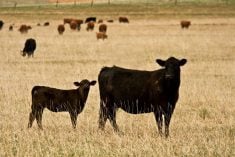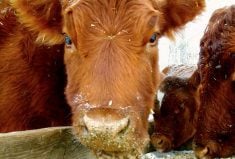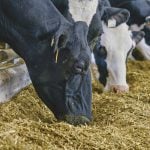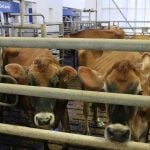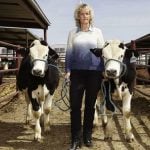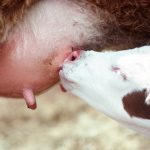Compared to last week, western Canadian feeder cattle prices were steady to $3 lower in Alberta while prices eroded by $2-$5 in Saskatchewan and Manitoba.
Noticeable weakness was evident in yearling prices, while grass cattle experienced limited slippage. Backgrounding operators are starting to liquidate fall-placed calves. Quality was quite variable, with fleshier cattle experiencing sharper discounts. Demand is limited for these heavier replacements, with Alberta and Saskatchewan feedlot inventories 20 per cent above the five-year average. June live cattle futures fell by $4.45 for the week and buyers were quick to adjust their bids each day. Alberta packers were taking fed cattle in the range of $157-$158, down from the highs of $165 earlier in January. Nearby feeding margins have stumbled into negative territory which also contributed to the softer tone.
Read Also

U.S. livestock: Cattle futures sink on concerns over Trump’s push to lower prices
Chicago | Reuters – U.S. cattle futures tumbled on Monday, extending a steep slide after President Donald Trump complained last…
In central Alberta, larger-frame medium-flesh tan steers averaging 855 lbs. were valued at $189 while similar quality 900-pounders brought back $187. Simmental mixed medium- to larger-frame heifers with heavier butter levels averaging 825-850 lbs. were quoted at $173 in the same region. A small group of mixed steers with fleshier characteristics weighing 880 lbs. were quoted at $175 in southern Alberta. In central Saskatchewan, fleshier Charolais blended steers weighing just over 900 lbs. were quoted at $176 while a group of red and tan heifers with medium flesh at 860 lbs. were reported at $172.
Calves were quite variable across the Prairies. Buyers shopping for grassers were the dominant feature while feedlot demand appeared to take second billing this week. In Manitoba, black steers weighing 660 lbs. were valued at $203 while similar-quality 540-pounders were quoted at $225. In southern Saskatchewan, 525-lb. Charolais blended steers reportedly sold for $233 while red and white face heifers weighing 565 lbs. were reported at $198. Temperatures and pen conditions have improved in most regions. Southern Alberta experienced severe wind at times, which can be just as harsh as extreme temperatures.
The U.S. Department of Agriculture’s biannual cattle inventory report, released Friday, pegged the 2019 calf crop at 36.06 million head, down 250,000 head from the 2018 output. Yearling values this fall have potential to be quite strong as this is the first contraction in the calf crop since aggressive expansion started in 2016.
— Jerry Klassen manages the Canadian office of Swiss-based grain trader GAP SA Grains and Produits Ltd. and is president and founder of Resilient Capital, specializing in proprietary commodity futures trading and market analysis. Jerry consults with feedlots on risk management and writes a weekly cattle market commentary. He can be reached at 204-504-8339 or via his website at ResilCapital.com.








